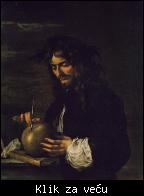|
Poslao: 06 Dec 2009 14:57
|
offline

- Pridružio: 07 Avg 2008
- Poruke: 2528
- Gde živiš: VII kat
|
Hvala, hvala. 
 
Italijanski barokni slikar, pesnik, kompozitor, pisac, glumac... Buntovnog duha, zamerio se Berniniju, između ostalih.
|
|
|
|
|
Registruj se da bi učestvovao u diskusiji. Registrovanim korisnicima se NE prikazuju reklame unutar poruka.
|
|
|
Poslao: 06 Dec 2009 17:44
|
offline
- tuzor

- Legendarni građanin

- Pridružio: 03 Sep 2007
- Poruke: 4115
- Gde živiš: U Kraljevstvu duha
|
Salvator(e) Roza, Autoportret.
Citat:As a painter, he is best known as an "unorthodox and extravagant" and a "perpetual rebel" [1] proto-Romantic.
. . .
While Rosa had a facile genius at painting, he pursued a wide variety of arts: music, poetry, writing, etching, and acting. In Rome, he befriended Pietro Testa and Claude Lorraine. During a Roman carnival play he wrote and acted in a masque, in which his character bustled about Rome distributing satirical prescriptions for diseases of the body and more particularly of the mind. In costume, he inveighed against the farcical comedies acted in the Trastevere under the direction of Bernini.
While his plays were successful, this also gained him powerful enemies among patrons and artists, including Bernini himself, in Rome. By late 1639, he had had to relocate to Florence, where he stayed for 8 years. He had been in part, invited by a Cardinal Giancarlo de Medici. Once there, Rosa sponsored a combination of studio and salon of poets, playwrights, and painters --the so called Accademia dei Percossi ("Academy of the Stricken").
. . .
Finally he returned to stay in Rome in 1649. Here he painted some important subjects, showing the uncommon bent of his mind as it passed from landscape into history Democritus amid Tombs, Death of Socrates, Regulus in the Spiked Cask (these two are now in England), Justice Quitting the Earth and the Wheel of Fortune. This last satirical work raised a storm of controversy. Rosa, endeavouring at conciliation, published a description of its meaning (probably softened down not a little from the real facts); nonetheless he was nearly arrested. It was about this time that Rosa wrote his satire named Babylon, under which name Rome was of course indicated.
[Link mogu videti samo ulogovani korisnici]
[Link mogu videti samo ulogovani korisnici]
|
|
|
|
|
|
|
Poslao: 06 Dec 2009 18:35
|
offline

- Pridružio: 07 Avg 2008
- Poruke: 2528
- Gde živiš: VII kat
|
Jeeee, odgovor je brzo došao. 
Taj je. Danas je poznat po brojnim pejzažima, koje on sam nije smatrao naročito značajnim u odnosu na svoje istorijske kompozicije.
Citat:According to the inscription, the picture was a gift by Rosa to his friend Giovanni Battista Ricciardi (1624–1686). Ricciardi was a man of letters and a reader in moral philosophy at Pisa. The painting is listed in an inventory drawn up after Ricciardi's death as "a philosopher who writes on a skull." Although it was later described as a portrait of Ricciardi, the figure resembles Rosa and it is likely to be a self-portrait. The wreath of cypress is an emblem of mourning, while on the table is a book by the Roman stoic philosopher Seneca (Seneca's name is a pentiment; it was painted out by Rosa). The Greek inscription on the skull reads "Behold, whither, when."
[Link mogu videti samo ulogovani korisnici]
[Link mogu videti samo ulogovani korisnici] - ovde je onaj poznatiji autoportret, sa natpisom 'Aut tace aut loquere meliora silentio (Either be silent or say something better than silence)'.
Tuzor, tebi nije dozvoljeno da zaćutiš, daj sledeće 
|
|
|
|
|
|
|
|
|
Poslao: 06 Dec 2009 20:54
|
offline

- Pridružio: 07 Avg 2008
- Poruke: 2528
- Gde živiš: VII kat
|
Kosta Hakman, Autoportret sa harmonikom
[Link mogu videti samo ulogovani korisnici]
"Ako bi trebalo odgovoriti na pitanje kojim plastičnim elementom, ili osobinom, Hakman najpre i najviše dotiče vreme i raspoloženje dvadesetih i tridesetih godina, odgovorio bih: srebrnim sivilom, tihom svetlošću koja preliva sve njegove kolorističke odnose. Osećam u njegovom delu onu melanholiju, ono unutarnje emocionalno sagorevanje kao naličje evazije pred zbiljom sveta, notu inače osobenu za srpsku umetnost između dva rata. Kao boju vremena nalazimo je u tadašnjem delu Čelebanovićevom, Milunovićevom, Lubardinom. Realnost kao da je potopljena ne samo u prirodnu već i u emocionalnu atmosferu. Hakman je pažljivo posmatrao stvarnost - gradski predeo, zelenilo u prirodi, predmete - ne menjajući ništa bitno, ne intervenišući intelektualno. Njegova četka samo prevodi ono što njegovo oko vidi, i prilikom tog prevođenja dolazi do delikatnog preobražaja senzacije u emociju, fragmenta u celinu, empirijskog u umetničko.
Miodrag B. Protić - Srpsko slikarstvo XX veka
|
|
|
|
|
|
|
Poslao: 07 Dec 2009 07:14
|
offline
- tuzor

- Legendarni građanin

- Pridružio: 03 Sep 2007
- Poruke: 4115
- Gde živiš: U Kraljevstvu duha
|
Јесте Коста. И добар је линк. Придружујем само овај на српском, где се могу наћи и занимљиви детаљи из живота и стваралаштва овог уметника:
[Link mogu videti samo ulogovani korisnici]
Јелкице, изволи! 
|
|
|
|
|
|
|
|
|
Poslao: 07 Dec 2009 22:04
|
offline
- tuzor

- Legendarni građanin

- Pridružio: 03 Sep 2007
- Poruke: 4115
- Gde živiš: U Kraljevstvu duha
|
Zgrada Secesije u Beču (sa svoje tri sove na fasadi i Klimtovim muralima unutra), koju je 1897. godine izgradio Jozef Marija Olbriht kao mesto - sastajalište članova bečke secesije.
[Link mogu videti samo ulogovani korisnici]
[Link mogu videti samo ulogovani korisnici]
Citat:'To Every Age Its Art, To Art Its Freedom'. So reads the proclamation over the entrance to this building. And for the nineteen artists who founded the Secession movement, those words were nothing short of a mantra. As the name denotes, the Secessionists had had enough of the stuffy staidness of the Academy and so they decided to go it alone. Gustav Klimt was elected the first leader of the association, which included Austrians, Poles and other pioneering artists from across the Habsburg Empire. Needless to say, the crowning element was derided as a 'golden cabbage' by the group's detractors, but such is life! Klimt's famed 'Beethoven Frieze' can still be savoured downstairs, and a small exhition chronicles the history of the movement.
[Link mogu videti samo ulogovani korisnici]
Citat:Located in Vienna, The Secession building was built in 1897 by Joseph Maria Olbrich as an architectural manifesto and exhibition hall for the secession group. Secession refers to the seceding of a group of rebel artists from the long-established fine art institution.
The building features The Beethoven Frieze by Gustav Klimt, one of the most widely recognized artworks of Secession style (a branch of Art Nouveau, also known as Jugendstil).
. . .
Jugendstil owls - Detail of the facade of the Viennese Secession Building. These designs for building’s facade decoration are attributed to Koloman Moser.
[Link mogu videti samo ulogovani korisnici]
|
|
|
|
|
|
|
Poslao: 07 Dec 2009 22:41
|
offline

- Pridružio: 07 Avg 2008
- Poruke: 2528
- Gde živiš: VII kat
|
Tačan odgovor tuzor, sove su se usaglasile da može dalje. 
|
|
|
|
|
|
|
|




















